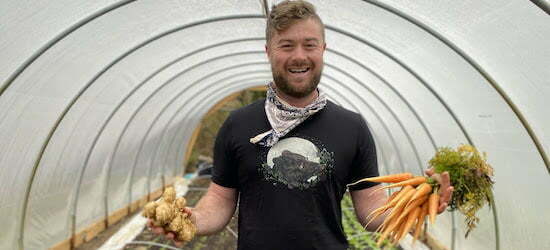ASAP likes to share the stories of people in the community who help us fulfill our mission. This month we talked to Seth Salmon, farmer and owner of Wildwood Herbal. The farm has been providing fresh produce and prepared meals for Meals on Wheels and recently became a partner in ASAP’s Appalachian Farms Feeding Families program.
How did you initially connect with Meals on Wheels?
We had been working with the Council on Aging and they had a relationship with Meals on Wheels. Debbie Sprouse, the Meals on Wheels executive director, had been working on a project to get fresh produce, and then received funding for it. It was really great timing and we were able to make it all line up. We had some meetings on the farm with their board and executive director and decided to go for it. Once that program, delivering fresh produce to homebound seniors, timed out, we wanted to keep something going. We started talking about prepared foods. Nothing they were doing was freshly prepared, and zero was from local farms. We wanted to try to do something about that.
Now, as a partner in ASAP’s Appalachian Farms Feeding Families program, what have you started doing?
We are still delivering fresh foods like cabbage, turnips, kale, lettuce, and winter squash, but also providing simple prepared foods. That’s usually cooked greens, fresh greens, and some type of more hearty thing made from storage or root vegetables, like butternut casserole. We have a volunteer system from the farm doing pre-preparation with the Meals on Wheels staff to turn the food into meals. So it’s kind of a training program as well. We know full well how hard it is to change people’s minds about how they eat. Changing the minds of staff, getting them to cook something versus just heating something up is a big learning curve. But it’s happening. You can give somebody fresh food all day long, but if they’re not willing to prepare it and make into something they like, they’re not going to eat it. It’s eyeball-popping when people who might not know how cabbage, carrots, and turnips gets turned into slaw see that and it’s like an epiphany.
Why was it important to you to continue the relationship with Meals on Wheels after the initial funding ran out?
The first project was so well received. Meals on Wheels issued a survey to customers to find out what they liked and didn’t, and it was overwhelmingly positive. I honestly didn’t expect that. I expected the recipes [sent with the fresh produce] to be overwhelming, but they wanted more.
Food for me has always been about growing and producing things that people want. When I get a chance to create this network of production and consumption, that’s the dream. I’m from a farming family. I know how hard it is. I don’t know if this is sustainable, but right now we’re just trying to make a huge impact for their service base.
We all need to be pushing forward as hard as we can. We have this place, this town, with a local food scene and it’s good. But there are a lot of farms out there struggling still. We sell ourselves as local food community. Other places in the country see advertising about local food in Asheville. But what percentage of the population is actually doing it? Anytime we can say, “Screw the old way, let’s push harder,” is good. This is another step.
Do you have favorite Thanksgiving recipes or seasonal ingredients?
We love pumpkin pad Thai with fresh ginger, fresh from the ground. Obviously Darsey’s sugar baby pumpkin pie with sorghum syrup and gingersnap crust. My famous winter collards, mashed turnips, baby carrots, and popcorn.

